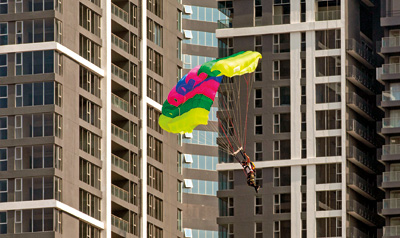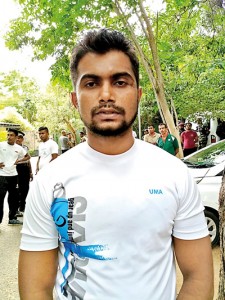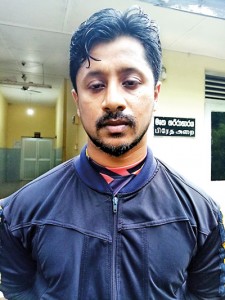News
Daring hero crashes to death in parachute tragedy
On Tuesday, one of the army’s top parachutists, Sergeant Major Champika Kumarasiri, 42, waved a salute at the soldiers lined up behind him and leapt out of a plane on his 681st parachute jump – it was to be his last, as he fell to his death in the Ampara jungles.

2019 Independence day jump from Shangri La Pix by Wasantha Chandrapala and Sameera Weerasekera
The shocked jumper whose parachute became fatally tangled up with SGM Kumarasiri’s harness but who survived the accident, told The Sunday Times how the tragic events unfolded.
Nineteen soldiers of the army’s 3rd Special Battalion and 37 soldiers of the Commando Regiment gathered at the Air Force camp at Ampara on August 13 to train for Operation Diyakawa, an annual joint military training exercise for local and foreign troops. The training was to go on until Wednesday.
SGM Kumarasiri, a well-known, talented parachutist and a veteran of 22 years in the army, was the training instructor, working under Major U.R.I. Perera.
The training went on smoothly for seven days and on Monday evening the group relaxed before the next day’s first flight jump.
On Tuesday, 14 members of the group prepared for their jump with SGM Kumarasiri continuing to instruct them on the procedure to be followed when coming down in a parachute. The soldiers boarded SLAF aircraft Y-12. They were to jump from a height of 10,000 feet.
SGM Kumarasiri was also making the jump, Four soldiers leapt out of Y-12 and then it was SGM Kumarasiri’s turn. He waved to the others behind him and jumped.
Just before him, Lance Corporal Harsha Sudesh had jumped. There was not much distance between the two. They both opened their parachutes at a height of 9000 feet and then the unimaginable happened: both parachutes became entangled.
Lance Corporal Sudesh described his terrifying experience in the air.

Champika at Independence day 2019
“Four soldiers had jumped before me. I jumped and after that it was Champika Sir.
“After a while, Sir asked me to open the two-count parachute and told me he would open the one-count parachute. I opened the parachute. Then I felt that, from my left, Sir and his parachute were swinging towards me. He collided with me and swung past me.
“He called out, “Sudesh, don’t be afraid. I will do something.’ No sooner had he said this than his lines started wrapping round my neck.
“I could not see Sir. He was behind me.
“I put my hands around my neck so I wouldn’t get strangled by the ropes. I called to him but there was no reply. As he didn’t speak, the only alternative I had was to cut off the line tightening around my neck.
“At first, I couldn’t free my hands. I couldn’t move my head. I freed one of my hands, took the knife used for emergencies kept hidden near my chest, and cut off the two lines that had tightened around my neck. Then Sir was let loose and slid away with the parachute.
“His parachute had opened but one side of it seemed to have folded up. Up in the air he had told me only, ‘Sudesh, don’t be afraid’. Thereafter he didn’t say a single word. For about one-and-a-half minutes we had been swinging in the air with our parachutes tangled. As Sir didn’t speak, the only thing I could do was to cut off the line tightening around my neck.
“Thereafter, I don’t know what happened. Only after I came down did I learn about the things that had happened,” Lance Corporal Harsha Sudesh said.
After losing control of his parachute, SGM Kumarasiri fell into jungle near the Uhana Air Force Camp. Although he was given medical treatment and rushed to Ampara Hospital he died en route.
Born in 1977 to his parents, H.K. Andris and K. Vimalawathi of Kirinda Puhulwella in the Matara District, he was the eldest child, with two brothers and a sister. He was educated at Puhulwella Maha Vidyalaya and Kumburupitiya National School.
His father died at the age of 51, leaving his Vimalwathi with untold difficulties in bringing up the children as a single parent.
In 1995, Champika Kumarasiri joined the army’s Tissa Regiment, then the 7th Vijayaba Regiment, and in 1998 the 3rd Regiment Special Battalion.
He was a brave soldier who served in key battles – operations Jaya Sikuru, Riviresa, Sath Jaya and Rivikirana.
He was awarded the army’s highest honour, the Weera Vickrema Vibhushana badge, and many other decorations such as the Rama Wickrema, Rana Shoora, Poora Bhoomi, North Manushiya and North-East badges as well as the 50th Army Anniversary Badge, 50th Independent Memorial Badge and the Foreign Service Badge.
His siblings also entered the forces, the sister, Deepika Malkanthi in the navy and the two brothers, Shammika Wijesiri and Indika Ratnasiri in the army. Shammika retired after being severely maimed in a bomb blast.
With the war coming to an end, SGM Kumarasiri concentrated on parachuting, and the army sent him for training in several other countries.
For the 70th anniversary of Independence celebrations last year, he performed a Base Jump using the Hotel Shangri La at Galle Face.

Dammika Wijesiri

Lance corporal Harsha Sudesh Kumara

Major Perera
This week his grieving family, including his wife, Nirosha Priyadarshini – who is pregnant with the couple’s third child – and his two children were among the thousands of mourners at his funeral. He had telephoned them the day before he was killed.
“His whole life was with parachutes,” his brother, Dhammika Wijesiri said. “We were always watching his performances. On the 70th Independence Day we were watching him performing at the Galle Face. Now unfortunately he has gone on his last journey in his parachute suit.”
“His death is a great loss to us all,” senior instructor Major Perera who came to pay his last respects to his colleague said. “Through a minor mistake he lost his life.
“There are only three persons doing the Base Jump in Sri Lanka. One of them was Major Kumarasiri.”
In the glow of the setting sun, SGM Kumarasiri was laid to rest this week with full military honours at the Puhulwella Ovitigamuwa Cemetery, the funeral attended by his whole village and thousands of others, among them Colonel Chandimal Peiris and Commander Major Janaka Ratnayaka of the 3rd Regiment.

